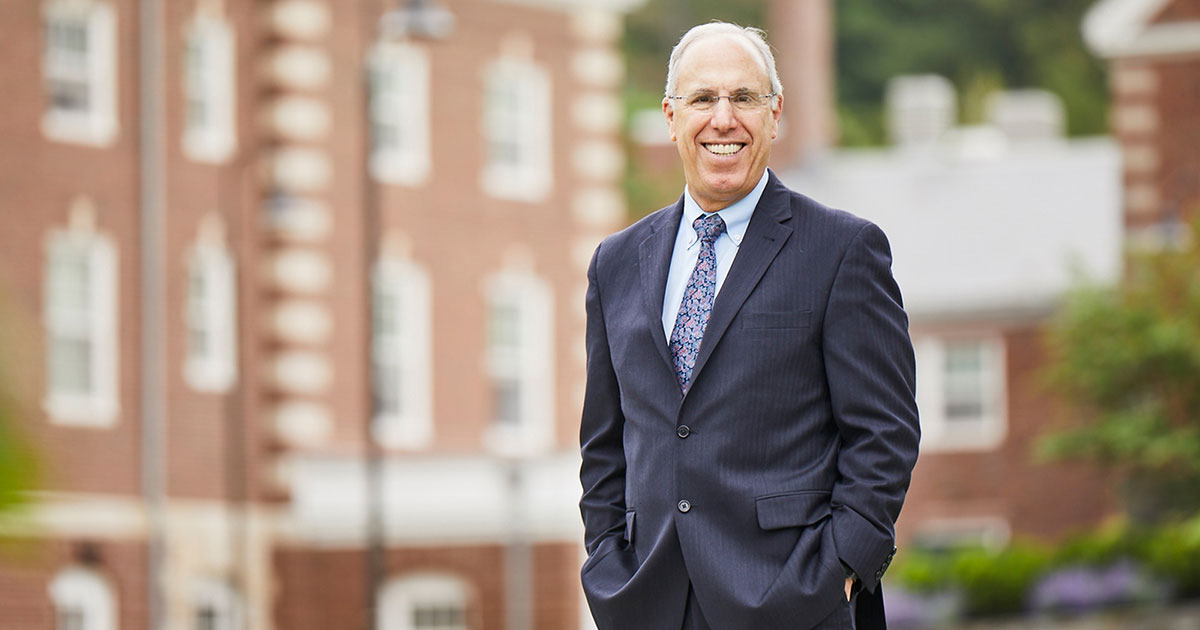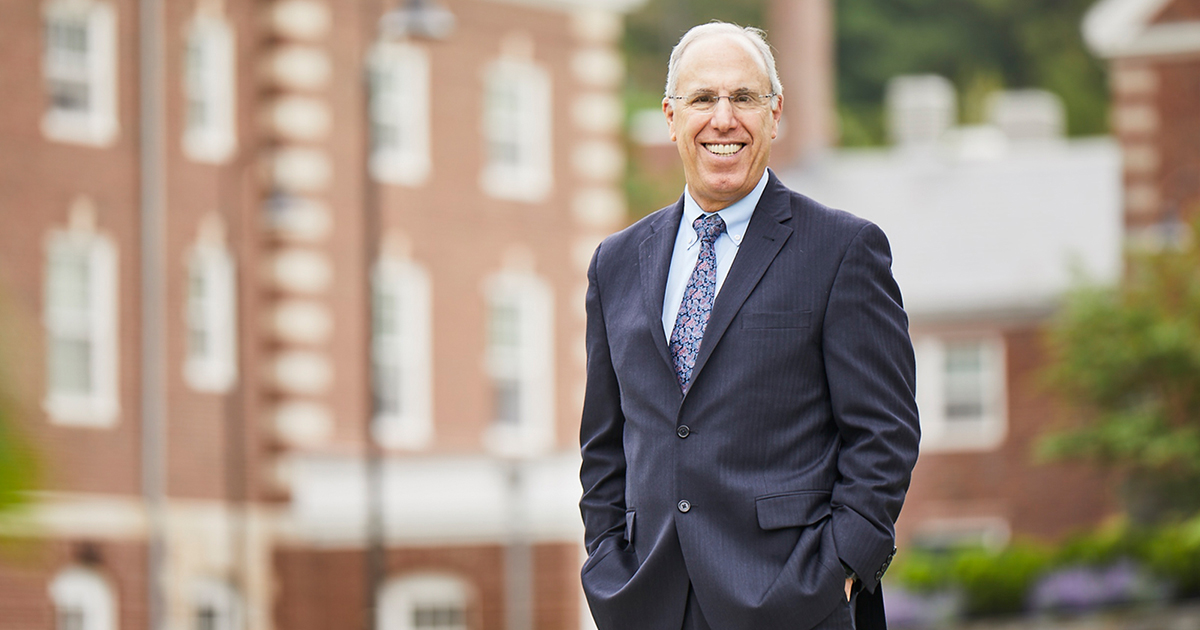A Year in Review

I arrived at Babson College prepared to lead change. With higher education on the precipice—facing widespread disruption, accelerating change, and foreboding market dynamics—our community recognized the essential need for evolution. Together, we embarked on an intense and comprehensive process to chart the course forward for the College.
When Congress passed the GI Bill in 1944, expanding the opportunity for a college education to some 8 million Americans, higher education as we know it emerged. For 70 years, a college education was viewed as an effective means to expand economic opportunity across all demographics. And, for 70 years—even as the world and workplace advanced—the higher education delivery and business model remained largely unchanged.
The last decade, marked by rising costs, stagnant high school graduation rates, increased competition, and a value proposition under pressure, has rendered that model untenable. Higher education has not kept pace with the highly networked society that has emerged from the rapid and ongoing transformations taking place in every other sector.
Technology has fundamentally altered the way learning is consumed, and competition is increasing in many forms. Online education offerings provide students flexible degree options. Businesses are turning to digital tools to train and educate employees with customized curriculum. YouTube sessions, MOOCs, and the flexibility of third-party providers are replacing college classrooms and semester learning.
Higher education is overdue for an overhaul.
As entrepreneurial leaders, we know that disruption is fertile ground for innovation. With that mindset, we designed a strategic plan for Babson to thrive. Just on the cusp of its implementation, COVID-19 changed the world—adding complexity, accelerating change, and creating new opportunities.
The Action
The strategic planning process, launched in May 2019, had a clear goal: engage the Babson community to rapidly develop a strategic plan for Babson to thrive in a changing environment.
On March 5, following 10 months of broad participation and input from our global community, thousands of hours of planning, discussion, refinement and stakeholder engagement, and endorsement from the Board of Trustees, five strategic initiatives were presented to the Babson community. That presentation came just five days before we made the difficult and heart-wrenching decision to close our physical campuses and transition to 100% virtual learning.
“The nature of our community—students, faculty, staff and alumni, industry leaders, and friends—makes Babson uniquely equipped to problem-solve amid uncertainty. We are entrepreneurial. We are flexible, creative, and resilient.”
Stephen Spinelli Jr. MBA’92, PhD
In a matter of 12 days, beginning with our March 10 announcement, 250 faculty members were trained to teach online, and 650 courses were migrated to the online platform. Nearly 1,900 students moved off campus. Faculty and staff transitioned to remote work. Student support services and experiential learning programs pivoted and moved online. Acute financial impacts reshaped the FY20 budget. And, our strategic initiatives to deliver education where, when, and how learners demand it, radically re-create our organization, and own entrepreneurial leadership were instantly challenged. I believe they are being validated.
Our transition to a virtual campus provided valuable insights that inform our goal to reach learners everywhere. In March, by necessity, we did this fast, driven to maintain academic continuity for our students. Now, with precious months of time, we’re improving our process and taking thoughtful and deliberate steps to reach learners where and how they demand it through technology-amplified offerings, relevant content, and new partner channels.
We also have mobilized to become a more inclusive, collaborative, and agile organization—One Babson—and to build a structure aligned with our strategy. Two weeks ago, we announced a new organizational model designed to make us flatter and more agile. The model elevates the learner experience in and out of the classroom and creates a more integrated and symbiotic relationship between academic leadership and student support services.
Perhaps most visibly, we continue to expand our focus on defining, owning, and innovating entrepreneurial leadership and developing new learning models. In November, we announced a groundbreaking collaboration and $50 million investment from the Blank Family Foundation to establish the Arthur M. Blank School for Entrepreneurial Leadership at Babson College. The school will advance and amplify values-driven entrepreneurial leadership on a global scale. Thanks to dedicated funding from the Blank Foundation, we have continued to make extraordinary progress while simultaneously working to alleviate the financial impacts of COVID-19. In a time of dire need and global opportunity, Arthur Blank ’63, H’98 once again demonstrates he is a world-class philanthropist.
The external headwinds of the past year—and in particular the past four months—were strong and potentially debilitating. Our response to the COVID-19 crisis has been guided by a senior leadership team that made a lot of hard decisions; good decisions that have navigated the College through acute challenges. And, the nature of our community—students, faculty, staff and alumni, industry leaders, and friends—makes Babson uniquely equipped to problem-solve amid uncertainty. We are entrepreneurial. We are flexible, creative, and resilient. The core tenets of entrepreneurial leadership are the fundamental characteristics of the Babson community. This entrepreneurial spirit and orientation toward action has facilitated our transition to a new way of working and learning, and will continue to guide our path forward.
The Future
Crisis pressure tests a strategy. Crises of global proportions like COVID-19 occur rarely and randomly. In the course of human endeavors, actions, and complex varied interactions create a trajectory … “the arc of history.” A punctuating event—like the stock market crash of 1929 leading to the Great Depression, Pearl Harbor plunging the world into World War II, and 9/11 reshaping modern life—jolts us into a future state. COVID-19 is the defining event of this generation’s courage.
Simultaneously, our country is collectively grappling with important concerns involving institutional racism and violence against the Black community. As a society, we have reached a critical juncture in pursuit of equity and inclusion. As entrepreneurial leaders, we have a responsibility to put our problem-solving skills to use in pursuit of social justice and to hold ourselves accountable to be actively anti-racist.
“At a time when the value proposition of higher education is in question, and the definition of community is being tested, Babson is proving our strength. A Babson degree is more valuable than ever.”
Stephen Spinelli Jr. MBA’92, PhD
It is clear that the world needs entrepreneurial leadership now more than ever. We need leaders who can employ the power of thinking and acting entrepreneurially to produce scalable solutions that benefit individuals, communities, and the world. Babson builds those leaders. Our community is prepared to tackle big challenges, lead with empathy, and innovate solutions.
At a time when the value proposition of higher education is in question, and the definition of community is being tested, Babson is proving our strength. A Babson degree is more valuable than ever. Our tremendous global network is connecting and collaborating in new ways. Our students—equipped with the skills and mindset to problem-solve, embrace uncertainty, and lead change—will be the leaders of the post-COVID era.
As I enter my second year as president, and as we navigate the next normal together, I am motivated, energized, and confident in our ability—as One Babson—to create lasting economic and social value and have a positive impact on businesses, communities, society, and the world.




